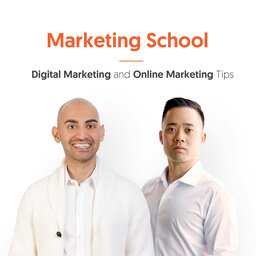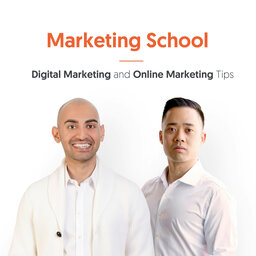Andrew Huberman hitpiece has reverse effect, Ad Creative is a 12x ROI multiplier?, and Flexport’s CEO NYTimes OpEd
In episode #2711, we dive into the power of ad creatives on advertising ROI, sharing insights on how creativity is a rare gem that can set a brand apart. We discuss the strategic importance of playing to your strengths and bringing in new talents to address weaknesses.There's a special focus on the undeniable value of authentic content—how it competes with top-tier publications in reach and impact. We also share our personal journeys in leveraging expertise for marketing effectiveness.
Don’t forget to help us grow by subscribing and liking on YouTube!
Check out more of Eric’s content (Leveling UP YT) and Neil’s videos (Neil Patel YT)
TIME-STAMPED SHOW NOTES:
- (00:00) Today's Topic: Andrew Huberman hitpiece has reverse effect, Ad Creative is a 12x ROI multiplier?, and Flexport’s CEO NYTimes OpEd
- (01:14) Andrew Huberman hit piece has reverse effect
- (04:45) Ad Creative is a 12x ROI multiplier?
- (13:25) Flexport’s CEO NYTimes OpEd
Go to https://www.marketingschool.io to learn more!
Leave Some Feedback:
- What should we talk about next? Please let us know in the comments below
- Did you enjoy this episode? If so, please leave a short review.
Connect with Us:
-
- Single Grain << Eric’s ad agency
- NP Digital << Neil’s ad agency
- X @neilpatel
- X @ericosiu
Marketing School - Digital Marketing and Online Marketing Tips
Neil Patel and Eric Siu bring you daily ACTIONABLE digital marketing lessons that they've learned th…Social links
Follow podcast
Recent clips

Mastermind Dinners: LeadGen That Actually Works in 2024
16:08

30M vs 500 Views - The One Change That Made All The Difference
12:35

AI concierge will affect dating - implications for business, Perplexity's AI-generated podcast, OpenAI dissolves team focused on long-term AI risks (less than one year after announcing it), Why swarming is killing SEO, and Ag1 spent $40m on podcasts
10:47
 Marketing School - Digital Marketing and Online Marketing Tips
Marketing School - Digital Marketing and Online Marketing Tips